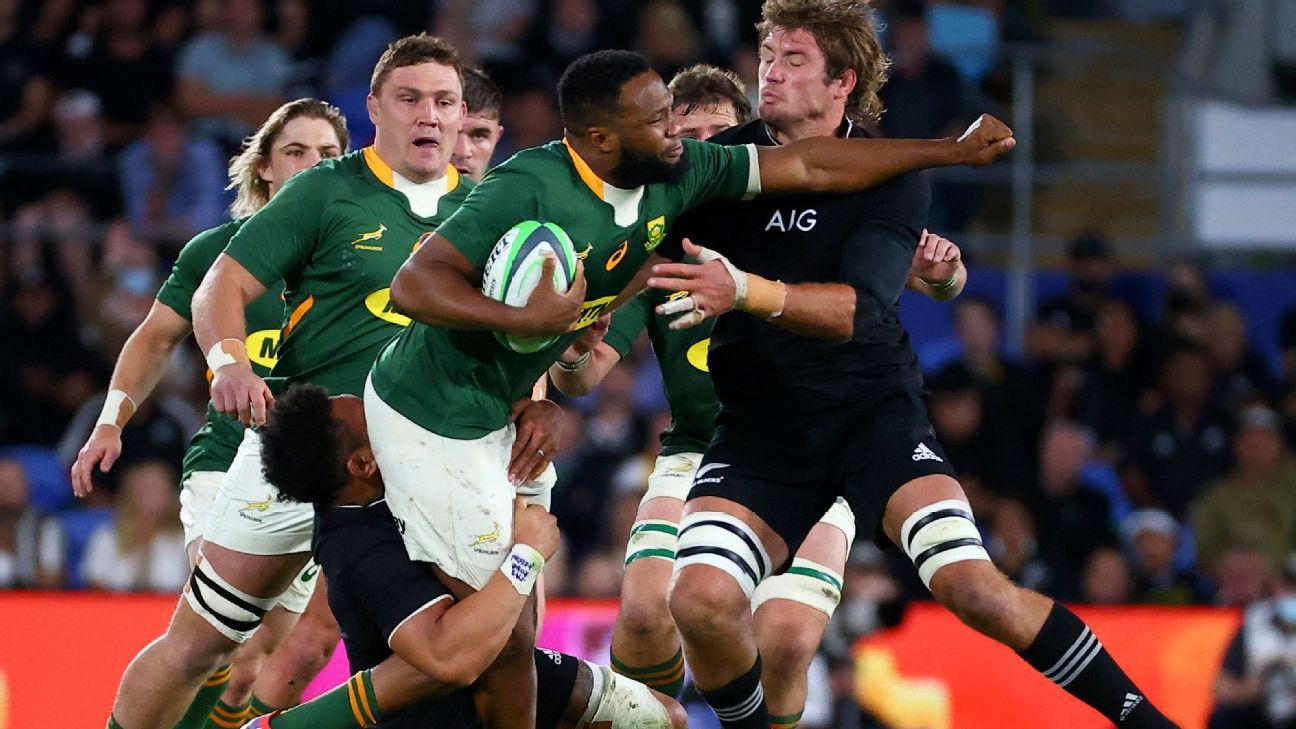The narrow nature of last week’s defeat to the Springboks mitigated the outcry that usually accompanies All Blacks losses. Honours shared was a fair reflection. Dig down into successive Rugby Championship Tests against the world champions, though, and familiar root causes evoke cause for concern.
The blueprint for upsetting the All Blacks has not changed for the best part of four years, since the British & Irish Lions escaped with their controversial drawn series.
While tactics differ depending on the strengths of the opposition, the general theme is to attack the All Blacks pack and deny world rugby’s deadliest backline go-forward ball and stable platforms to strike.
For all the focus on the Boks’ high ball assault led by Faf de Klerk’s bomb squad, South Africa’s pack succeeded in largely dominating the All Blacks. And with the northern tour looming, you can be sure Ireland and France will note the Boks success there.
Against the Wallabies and Pumas the All Blacks pack made significant strides with their attitude towards physicality. Nepo Laulala’s huge hit on Pablo Matera typified the mentality, but that was merely one example.
In those matches the All Blacks breakdown cleanouts brought urgency and intent; forward carries regularly punched over the advantage line to pave the way for the backline to run rampant, claiming 24 tries in four Tests.
Four convincing victories suggested the All Blacks had turned a corner. The set-piece, too, was humming. The All Blacks scrum marched forward; they scored from rolling mauls and repelled repeated attempts from the Wallabies and Pumas.
The biggest concern since England steamrolled the All Blacks in the 2019 World Cup semifinal had been seemingly addressed. Only then, they ran headfirst into the Boks and a reality check.
With Siya Kolisi leading the charge, South Africa monstered the All Blacks breakdown at times to win turnovers and disrupt their ability to build pressure by stringing phases together.
Some of that was helped, particularly in the second Test, by English referee Matthew Carley failing to consistently identify several big Boks not rolling away after making tackles, which allowed the likes of Malcolm Marx to get over the ball.
From a defensive perspective the Boks came off the line hard and fast to stop the All Blacks ball carriers behind the gain line, and then slow the ruck. This limited Beauden Barrett’s time and space, largely forcing him to play off the backfoot and look for cross-field kicks. Some of those came off. Some did not.
The All Blacks were at their best striking from stable set piece platforms. Hitting the ball at pace, with ample space to the defensive line, presents pockets of gold for the All Blacks. Here they hurt the Boks, making easy metres by picking holes and exploiting a scrambling defensive line.
It didn’t happen often enough, though, as the Boks gained the upper hand at the set piece.
In the first Test the Boks overpowered attempted drives by giving the All Blacks front lineout ball and pushing them towards the touchline. In the second Test the All Blacks stunning try to Ardie Savea came from rare back lineout ball, but across the two Tests they lost seven throws to squander many prime attacking chances.
When the Boks unleashed their front-row off the bench just before half time on the Gold Coast they helped wrestle back momentum by dominating the scrum, too.
The combined returns of lineout commander Sam Whitelock, injured captain Sam Cane and freakish hooker Dane Coles will significantly bolster the All Blacks pack for their northern tour. Whitelock is a brilliantly astute leader and Cane, despite spending the past six months on the sideline, remains one of the world’s best defenders. Coles brings a different dimension to the edge of the field while adding composure to lineout throwing.
Collectively, though, in many ways confronting the Boks, and other defensive-minded teams, demand multiple shifts from New Zealand forwards. When the All Blacks can’t dictate the pace of the game and getting involved with ball in hand becomes challenging, offloads and rangy runs are secondary to cleaning bodies from rucks and being dominant on defence. Essentially, the dirty work takes priority.
Akira Ioane, so prominent against the Wallabies, faded into obscurity against the Boks compared to Ardie Savea’s standout performance in the second Test and Ethan Blackadder’s prominence from openside in the first.
Former All Blacks captain Kieran Read admitted this week the Boks loose forwards outshone their counterparts.
“They’ve been reasonably strong but the South Africans maybe got the edge over them in a couple of Tests which was a bit disappointing that we couldn’t impose ourselves,” Read said.
“I don’t think we played particularly well in those couple of games. Our scrum was solid, but our lineout didn’t function quite as well and that’s where we’re going to have to improve a lot, especially against teams similar to that style.”
It’s certainly not doom and gloom for the All Blacks. Ian Foster locked away the Bledisloe Cup and Rugby Championship titles while handing many players their first exposure to the Boks.
Foster’s All Blacks remain in something of a development phase as they work out their best line-up and strategies to combat teams with suffocating styles.
Expectations are such, though, that progress from the pack must be evident on the northern tour or the All Blacks risk being continually pinned down and smacked in the mouth by the bully boys of the world game.
